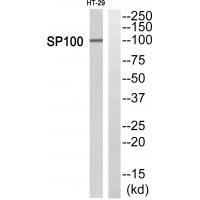
| WB | 咨询技术 | Human,Mouse,Rat |
| IF | 咨询技术 | Human,Mouse,Rat |
| IHC | 咨询技术 | Human,Mouse,Rat |
| ICC | 技术咨询 | Human,Mouse,Rat |
| FCM | 咨询技术 | Human,Mouse,Rat |
| Elisa | 咨询技术 | Human,Mouse,Rat |
| Aliases | DKFZp686E07254; FLJ00340; FLJ34579; Lysp100b; nuclear antigen Sp100 |
| Entrez GeneID | 6672; |
| WB Predicted band size | 100kDa |
| Host/Isotype | Rabbit IgG |
| Antibody Type | Primary antibody |
| Storage | Store at 4°C short term. Aliquot and store at -20°C long term. Avoid freeze/thaw cycles. |
| Species Reactivity | Human |
| Immunogen | Synthesized peptide derived from Internal of human SP100. |
| Formulation | Purified antibody in PBS with 0.05% sodium azide. |
+ +
以下是3篇与SP100抗体相关的研究文献概览:
---
1. **文献名称**:*Autoantibodies against the promyelocytic leukemia protein PML and the Sp100 nuclear antigen in primary biliary cirrhosis*
**作者**:Güttler F, et al.
**摘要**:该研究探讨了原发性胆汁性胆管炎(PBC)患者中抗SP100和抗PML抗体的临床意义,发现这两种自身抗体可作为PBC的特异性血清标志物,与疾病进展和肝功能异常相关。
---
2. **文献名称**:*The Sp100 autoantigen is a component of the nuclear dots disease-associated proteins*
**作者**:Sternsdorf T, et al.
**摘要**:研究揭示了SP100蛋白在核点结构中的功能,发现其表达受干扰素诱导,并可能在抗病毒免疫中发挥作用。同时,SP100自身抗体与自身免疫性疾病(如PBC)的关联被进一步证实。
---
3. **文献名称**:*Molecular cloning and characterization of the Sp100 nuclear antigen*
**作者**:Szostecki C, et al.
**摘要**:该研究首次克隆了SP100基因并分析了其蛋白结构,指出SP100在细胞核内形成多蛋白复合物,其自身抗体的产生可能与病毒感染或遗传易感性触发的异常免疫反应有关。
---
这些文献涵盖了SP100抗体的临床意义、分子机制及诊断价值,适用于自身免疫疾病研究参考。如需具体发表年份或期刊,建议通过学术数据库进一步检索。
The SP100 antibody is an autoantibody targeting the SP100 protein, a component of nuclear structures known as nuclear dots or PML nuclear bodies (PML-NBs). SP100 (Speckled Protein 100 kDa) was first identified in the 1990s as an autoantigen in patients with autoimmune diseases, particularly primary biliary cholangitis (PBC). It is a multifunctional protein involved in transcriptional regulation, chromatin remodeling, and antiviral responses. SP100 interacts with PML and other nuclear body components to mediate processes like apoptosis, DNA repair, and interferon signaling.
In clinical contexts, SP100 antibodies are primarily associated with PBC, a chronic autoimmune liver disease. They are detected in approximately 20-30% of PBC patients, often alongside anti-mitochondrial antibodies (AMA), the hallmark serological marker. However, SP100 antibodies can also occur in AMA-negative PBC cases, serving as a supplementary diagnostic marker. Their presence may correlate with disease severity or progression, though this remains debated.
SP100 antibodies are less commonly linked to other autoimmune conditions, such as systemic lupus erythematosus (SLE) or Sjögren's syndrome. Detection typically involves indirect immunofluorescence (showing nuclear dot patterns) or immunoblot assays. While their exact pathogenic role is unclear, SP100 antibodies are valuable biomarkers for PBC diagnosis, especially in AMA-negative patients, and contribute to understanding autoimmune dysregulation targeting nuclear components.
×